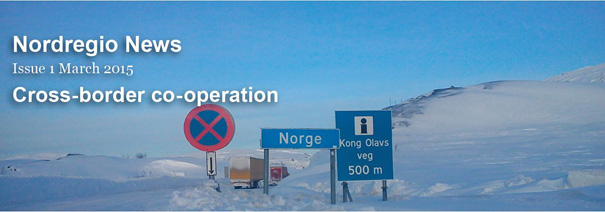
Cross-border co-operation
In this issue of Nordregio News, we focus on cross-border co-operation and its impact on regional development in Nordic and European border regions. We have studied how cross-border co-operation is structured and managed, and whether its full potential for sustainable growth has been realized. The added value of cross-border co-operation can be defined and measured in various ways, including improvement of cross-border infrastructure and increasing flows of tourists.
Read more
Added value of cross-border co-operation
By Lisa Hörnström, Aslı Tepecik Diş and Anna Berlina
Cross-border co-operation has the objective of reducing the effects of barriers, including administrative, legal and physical barriers, that are found at borders. Local and regional authori-ties and organizations co-operate across borders to promote regional development by improving infrastructure and public transport, by managing and monitoring common cultural and natural heritage and by reducing border obstacles such as differences in national regulation in order to facilitate mobility across borders.
Read more
The Swedish-Norwegian cross-border region
By Bjarge Schwenke Fors
The Swedish–Norwegian region, as defined in the project, spans the northernmost section of the 1630 km long Swe-dish–Norwegian border. It includes the Swedish towns and municipalities of Gällivare and Kiruna, and the region of Ofo-ten with the town of Narvik on the Norwegian side of the bor-der (see map 2). The region is sparsely populated, with 70 000 people living within an area of 42 000 square km (the size of Denmark). Rough mountainous terrain separates the Norwegian and Swedish parts of the region from each oth-er. The only cross-border connections are a road (European route E10) and a railway (the Iron Ore Line). Mining is the principal economic activity in the region. Iron ore (90% of the EU’s total production) is extracted on the Swedish side and transported across the border to the warm-water, deep-sea port of Narvik, from where it is shipped to the world market.
Read more
On the added value of cross-border co-operation:
The view from EUBORDERREGIONS
By James Scott
Cross-border co-operation (CBC) can be defined as political projects carried out by state, private and third-sector actors with the express goal of extracting benefit from joint initiatives in various economic, social, environmental and political fields. Through new forms of political and economic interaction – both institutional and informal – it has been suggested that greater cost-effectiveness in public investment can be achieved, eco-nomic complementarities exploited, the scope for strategic planning widened and environmental problems more directly and effectively addressed. Furthermore, research interest in CBC has been spurred by the momentous political changes of the past two decades.
Read more
Back to Nordregio News